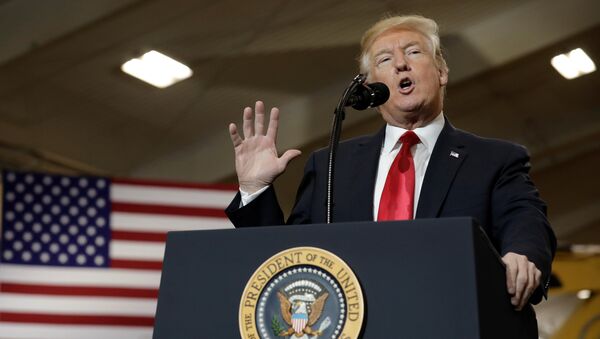Sputnik: What are your thoughts on the recent comment made by Trump, what consequences can it have?
Arturo Gal: The consequence that we can already see are, for example, European Air Traffic control issued an alert of possible air strikes happening in Syria within the next 72 hours. So I think the next 3 days are going to be very critical for the outcome. I totally agree with professor Doctor Stephen Cohen, he's an American expert on Russia, when he says that this situation is more dangerous than the Cold War. And the reason for that is because during the Cold War, the USA and USSR had channels of communication and they had set up boundaries, which they knew they couldn't go around. But now it seems that the only channel of communication that the American President has is his Twitter account, and that's no way to rule any country, whatsoever.
READ MORE: Threat of Western Strike on Syria: What is Known So Far
Sputnik: Do you think that what he's saying in Twitter is actually going to happen?
Arturo Gal: It's more likely that this post chemical attack was set up to force an intervention in Syria, therefore the cover-up of this false flag operation by destroying evidence is very irrelevant for the US. It has more to do with the true reason of the false flag operation, that is, to create the conditions in which an intervention can be launched. But more importantly, this intervention will be supported by the population, at least to some extent. So it's not a matter of willingness or the right thing to do that the American government is looking for, but a favorable situation for launching an attack.
Sputnik: How afraid should we be? Because Russia has said that they're going to be shooting down any US missiles or any other missiles that are fired over Syria. Or would we see a scenario where's a launch through a neighboring country, as Israel did?
Arturo Gal: Of course that could lead to a confrontation between both countries. Maybe not directly but with this new post on Twitter by Trump, we can expect that the US won't like having its missiles shot down by Russians and will probably hit Russian anti-aircraft batteries, causing Russian casualties. From that point on we can only imagine what could possibly happen. A direct hit on the Russian naval base in Tartus could also lead to a major open war confrontation.
Sputnik: Iran and Syria could hypothetically position their planes in such a way as to mix them up with Russian planes in order to sort of safeguard equipment but this could also lead to some kind of problems because when they target the Iranian or Syrian planes that are intermixed, they could actually end up damaging a Russian plane or there could be Russian casualties, and that could have completely different circumstances, a completely different reaction.
Arturo Gal: It comes down to the willingness of the Syrian allies and American allies, for example England and France and Germany. They're discussing already if they're willing to create a coalition, like they tried to do in Libya or Iraq. And I think it comes down to the willingness of the allies to support each other and how deeply they are willing to go in order to secure their interests and support their common allies. The wars for the American Israeli, and Saudi proxy terrorist groups are pretty much over for them, it's pretty much lost.
READ MORE: Syrian MP: Why Didn't US Use Its 'Smart Missiles' Against Terrorists in Syria?
So I think, like I said, that they're trying to create some conditions to manage a favorable situation so the international community will look up to Syria and probably try to pass a resolution to agree on a controlled airspace or whatever; a bombing campaign they're trying to go for. But I think it's pretty obvious that the leading groups, America, Israel, and Saudi Arabia, are not very happy with the outcome the war in Syria is taking. They're trying to make whatever they want so they can probably make it longer or at least shift the balance in favor of the terrorist groups.
Sputnik: Why? Can you explain what the motive is? What is it that the allies that you just listed want, what is their goal?
Arturo Gal: It has to be said from a military expertise that they had this long plan about going into Iraq, Libya, Syria, Iran. These are places where American and Israeli interests were not that much secure… These countries had a national production not even socialist but still capitalist but some national interests and that's never accepted in these countries — in America or France the powers that don't like these countries to have their own strategic economy, their own markets and stuff. And that's pretty much the reason that they want to annihilate these governments and set up friendly regimes.
READ MORE: Unconfirmed Israeli PHOTO Alleges Russian Ships Moving Around Syrian Port
Sputnik: I just want to ask your opinion on the legality of this, of carrying out missiles strikes in terms of international law.
Arturo Gal: As a lawyer I should say it kind of hurts me but there's no legal situation in this whole scenario. America is already violating international law as much as other countries are doing in the Syrian war. And that's because the resolution 3314 of the General Assembly, in article 1 gives us a definition of aggression and it's very obvious what's happening since aggression is the use of armed force by a state against the sovereignty, territorial integrity or political independence of another state: that's pretty much what's taking place.
The views of the speaker do not necessarily reflect those of Sputnik.



